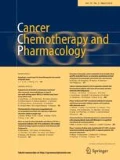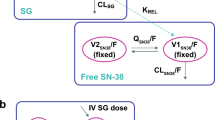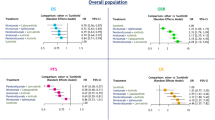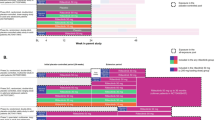Abstract
Purpose
Sunitinib, an oral multitargeted tyrosine kinase inhibitor that inhibits VEGFR, PDGFR, FLT3, KIT, and RET, is currently approved for the treatment of imatinib-refractory GIST and advanced renal cell carcinoma at a dose of 50 mg daily for 4 weeks followed by a 2-week off period (4/2 schedule). This trial was performed to investigate the safety, tolerability, and pharmacokinetics of sunitinib 50 mg daily for 2 weeks followed by a 1-week off period (2/1 schedule).
Experimental design
Twelve patients with advanced refractory malignancies were treated with sunitinib on the 2/1 schedule. Intensive safety monitoring included serial measurements of left ventricular ejection fraction (LVEF). Extensive pharmacokinetic sampling was performed on days 1 and 14 of course 1, and on day 14 of courses 2 and 3 to evaluate sunitinib and the SU12662 metabolite.
Results
Twelve patients received a total of 50 courses with an average (±SD) off-drug period of 11.5 ± 5.7 days. Two patients experienced DLT: one patient had asymptomatic grade 4 elevations in lipase and amylase, and another patient had an asymptomatic grade 2 decline in LVEF in course 1. In total, five patients demonstrated asymptomatic grade 2 declines in LVEF. Other principal effects were similar to previous experience with sunitinib, including fatigue, myelosuppression, skin discoloration, and gastrointestinal effects. Pharmacokinetic studies revealed no significant accumulation of sunitinib or SU12662. One patient with papillary thyroid cancer developed a partial response, and was on study for 16 courses, followed by an additional 18 courses on a continuation protocol.
Conclusions
The 2/1 schedule of sunitinib 50 mg was tolerable, and no significant drug accumulation was demonstrated. The safety profile on this schedule was consistent with the safety profile of sunitinib when administered on a 4-week on, 2-week off schedule.

Similar content being viewed by others
References
Abrams TJ, Lee LB, Murray LJ, Pryer NK, Cherrington JM (2003) SU11248 inhibits KIT and platelet-derived growth factor receptor β in preclinical models of human small cell lung cancer. Mol Cancer Ther 2:471–478
Abrams TJ, Murray LJ, Pesenti E et al (2003) Preclinical evaluation of the tyrosine kinase inhibitor SU11248 as a single agent and in combination with “standard of care” therapeutic agents for the treatment of breast cancer. Mol Cancer Ther 2:1011–1021
Cella DF, Lai JS, Chang CH, Peterman A, Slavin M (2002) Fatigue in cancer patients compared with fatigue in the general United States population. Cancer 94:528–538
Demetri GD, George S, Heinrich MC et al; for the GIST SU11248 Study Group (2003) Clinical activity and tolerability of the multi-targeted tyrosine kinase inhibitor SU11248 in patients with metastatic gastrointestinal stromal tumor refractory to imatinib mesylate. J Clin Oncol 22(Suppl):814 (Abs 3273)
Demetri GD, van Oosterom AT, Blackstein M et al (2006) Phase 3, multicenter, randomized, double-blind, placebo-controlled trial of SU11248 in patients (pts) following failure of imatinib for metastatic GIST. Lancet 368:1329–1338
Escudier B, Szczylik C, Eisen T et al (2005) Randomized phase III trial of the Raf kinase and VEGFR inhibitor sorafenib in patients with advanced renal cell carcinoma. J Clin Oncol 23(Suppl):380s (Abs LBA4510)
Faivre S, Delbaldo C, Vera K et al (2006) Safety, pharmacokinetic, and antitumor activity of SU11248, a novel oral multitarget tyrosine kinase inhibitor, in patients with cancer. J Clin Oncol 24:25–35
Fiedler W, Serve H, Dohner H et al (2005) A phase I study of SU11248 in the treatment of patients with refractory or resistant acute myeloid leukemia or not amenable to conventional therapy for the disease. Blood 105:986–993
Hurwitz H, Fehrenbacher L, Novotny W et al (2004) Bevacizumab plus irinotecan, fluorouracil, and leucovorin for metastatic colorectal cancer. N Engl J Med 350:2335–2342
Kim DW, Jo YS, Jung HS et al (2006) An orally administered multi-target tyrosine kinase inhibitor, SU11248, is a novel potent inhibitor of thyroid oncogenic RET/PTC kinases. J Clin Endocrinol Metab 91:4070–4076
Kodama Y, Asai N, Kawai K et al (2005) The RET proto-oncogene: a molecular therapeutic target in thyroid cancer. Cancer Sci 96:143–148
Marzola P, Degrassi A, Calderan L et al (2005) Early antiangiogenic activity of SU11248 evaluated in vivo by dynamic contrast-enhanced magnetic resonance imaging in an experimental model of colon carcinoma. Clin Cancer Res 11:5827–5832
Mendel DB, Laird AD, Xin X et al (2003) In vivo antitumor activity of SU11248, a novel tyrosine kinase inhibitor targeting vascular endothelial growth factor and platelet-derived growth factor receptors: determination of a pharmacokinetic/pharmacodynamic relationship. Clin Cancer Res 9:327–337
Miller KD, Chap LI, Holmes FA et al (2005) Randomized phase III trial of capcitabine compared with bevacizumab plus capectiabine in patients with previously treated metastatic breast cancer. J Clin Oncol 23:792–799
Motzer RJ, Rini BI, Bukowski RM et al (2006) Clinical trial of sunitinib malate (SU11248) demonstrates efficacy in patients with metastatic renal cell carcinoma. JAMA 295:2516–2524
Motzer RJ, Michaelson MD, Redman BG et al (2006) Activity of SU11248, a multitargeted inhibitor of vascular endothelial growth factor receptor and platelet-derived growth factor receptor, in patients with metastatic renal cell carcinoma. J Clin Oncol 24:16–24
Motzer RJ, Hutson TE, Tomczak P et al (2007) Sunitinb versus interferon alfa in metastatic renal-cell carcinoma. N Engl J Med 356:115–124
Mross K, Drevs J, Muller M et al (2005) Phase I clinical and pharmacokinetic study of PTK/ZK, a multiple VEGF receptor inhibitor, in patients with liver metastases from solid tumours. Eur J Cancer 41:1291–1299
O’Farrell AM, Abrams TJ, Yuen HA et al (2003) SU11248 is a novel FLT3 tyrosine kinase inhibitor with potent activity in vitro and in vivo. Blood 101:3597–3605
Osusky KL, Hallahan DE, Fu A, Ye F, Shyr Y, Geng L (2004) The receptor tyrosine kinase inhibitor SU11248 impedes endothelial cell migration, tubule formation, and blood vessel formation in vivo, but has little effect on existing tumor vessels. Angiogenesis 7:225–233
Rosen L, Mulay M, Long J et al (2003) Phase I trial of SU011248, a novel tyrosine kinase inhibitor in advanced solid tumors. J Clin Oncol 22(Suppl):191 (Abs 765)
Pfizer Inc., New York (2006) SUTENT (sunitinib malate) prescribing information. Available at http://www.pfizer.com
Yellen SB, Cella DF, Webster K, Blendowski C, Kaplan E (1997) Measuring fatigue and other anemia-related symptoms with the Functional Assessment of Cancer Therapy (FACT) measurement system. J Pain Symptom Manage 13:63–74
Author information
Authors and Affiliations
Corresponding author
Additional information
Grant Support: National Cancer Institute/Avon Foundation Progress for Patients Award (Carolyn Britten), Stop Cancer Career Development Award (Carolyn Britten).
Rights and permissions
About this article
Cite this article
Britten, C.D., Kabbinavar, F., Randolph Hecht, J. et al. A phase I and pharmacokinetic study of sunitinib administered daily for 2 weeks, followed by a 1-week off period. Cancer Chemother Pharmacol 61, 515–524 (2008). https://doi.org/10.1007/s00280-007-0498-4
Received:
Accepted:
Published:
Issue Date:
DOI: https://doi.org/10.1007/s00280-007-0498-4




